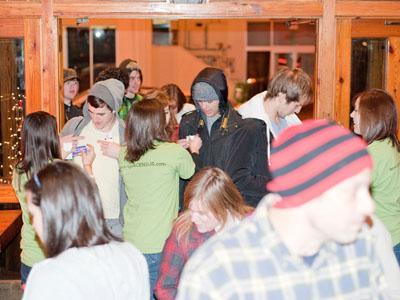College students are often counted among the transient communities that can be missed in census counts.Some students believe their parents should fill out the census for them. But, students are encouraged to complete the census where they live for most of the year.The government allocates more than $400 billion in federal funding to communities based on census data, according to the U.S. Census Bureau.This funding affects transportation, public health and education nationally.The repreCENSUS campaign, a team of University students participating in the national Bateman competition in public relations, is promoting participation in the census to University students and the Baton Rouge community.RepreCENSUS plans to commit 3,000 Baton Rouge residents and college students to fill out the census.To complete this goal, the team is promoting the census at events across campus.The Bateman team passed out stickers and stamps at the Owl City concert at the Varsity Theatre on Tuesday night.”Ten questions in 10 minutes can affect the next 10 years of your life,” said Bateman team member Lauren St. Pierre. The 2010 Census is the shortest in history to increase the ease of the survey, according to the Bureau.The first U.S. census took place in 1790 and found about 3.9 million inhabitants, according to the Bureau.RepreCENSUS plans to attend gymnastics meets, basketball games and various student organizations throughout the month.East Baton Rouge Mayor-President Kip Holden proclaimed February “U.S. Census Awareness Month” in Baton Rouge at the Metropolitan Council meeting Wednesday.The Bureau’s official van tour stopped at the Bonne Carre’ Business Center in Baton Rouge on Tuesday.The “Portrait of America” 13-bus tour promoted census awareness in Baton Rouge with giveaways and a live band, said Bridget Cloud, Bateman team member.April 1 was declared “Census Day” at the bus tour, Cloud said.The Bureau will mail out the forms in March, and they will be available in dorms, residence halls and Greek houses, according to Cloud.The census decides congressional seats and where district lines are redrawn. Louisiana is predicted to lose a congressional seat, said Kirby Goidel, associate professor of mass communication and political science.Louisiana’s population is growing, but not at the rate of other states. Unlike other states, Louisiana’s main population growth comes from birth instead of immigration, Goidel said.”With Hurricane Katrina, Louisiana had a late influx of immigrant population compared to other southern states,” said Laura Moyer, political science assistant professor. “Also, many families relocated to different places.”Some of Moyer’s students are collecting information about hard-to-count populations as part of her political science class for the League of Women Voters.”There is an advantage in finding what the challenges are to collecting census data and documenting it to see in the future,” Moyer said.Moyer plans to share the data with communities and other leagues across the country.The census also provides a short-term economic stimulus by employing and training community members in short-term jobs to distribute, collect and analyze census data.”The [Bureau] trains its own workers. It doesn’t delegate to other groups,” Moyer said.Some Americans find the census questionnaire intrusive — questions about income, race and poverty may be too personal.The Bureau cannot share any information with anyone by law, including federal agencies.”It is confidential, primarily used to find out what a community is like,” Goidel said.Non-U.S. citizens and internationals must also fill out the forms.—–Contact Grace Montgomery at [email protected]
RepreCENSUS campaign promotes national census locally
February 11, 2010

Jennie Armstrong, mass communication junior, and Erica Fischer, mass communication senior, from the Bateman team are promoting the repreCENSUS campaign around Baton Rouge. They passed out stickers Tuesday at the Varsity Theatre.





